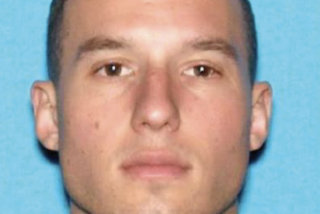Man convicted of lying about massacre in seeking citizenship
A federal jury convicted a Moreno Valley man Tuesday of lying on his U.S. citizenship application about his military role in the 1982 massacre of a village during the Guatemalan civil war.
Jurors found Jorge Sosa, 55, guilty of making false statements and obtaining citizenship unlawfully, according to his attorney, Shashi Kewalramani.
Sosa, a martial arts instructor holding American and Canadian citizenship, faces a maximum of 15 years in prison and having his U.S. citizenship revoked when he is sentenced Dec. 19.
“I’m very disappointed,” Kewalramani said of the verdict. “But I have to recognize that the evidence the government put on was horrific. It’s hard to divorce that from the forms, it’s hard to divorce the emotions in all of that.”
In a Riverside courtroom last week, federal prosecutors focused on the violence Sosa was accused of trying to hide from immigration officials.
Prosecutors said Sosa was a commanding officer in the Guatemalan military’s special operations force known as the Kaibiles, and was involved in a 1982 massacre in the small village of Dos Eres.
Prosecutors said the commando unit slaughtered more than 160 people — including women, children and the elderly — during the attack.
Women were raped, they said, and villagers were gathered and thrown into a well. Prosecutors also said Sosa fired his rifle and threw a grenade into the well during the massacre.
Prosecutors were also able to call on witnesses who had served with Sosa in the Kaibiles and were in Dos Eres.
Although prosecutors focused much of their attention on the details of the assault, Kewalramani argued that the trial was centered on whether Sosa lied on immigration forms.
“It’s not a war crimes tribunal,” Kewalramani told jurors during his opening statement. “We’re not here to decide that. It’s ‘Did he lie?’ ”
Kewalramani argued that in previous documents Sosa filed as part of a failed attempt to gain political asylum, the defendant noted his time in the military and included a letter that contained a threat against his family because of his service.
Prosecutors argued that Sosa deliberately tried to hide his past.
“He tried to apply as a new and improved Jorge Sosa,” Brian Skaret, a Justice Department attorney, told the jury. “He wanted to appear as a different man. He wanted to run from his past.”
Times staff writer Rick Rojas contributed to this report.
More to Read
Sign up for Essential California
The most important California stories and recommendations in your inbox every morning.
You may occasionally receive promotional content from the Los Angeles Times.











